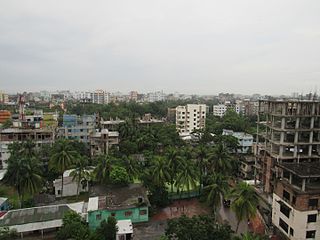
Comilla District, officially known as Cumilla District, is a district located in southeastern Bangladesh. It lies about 100 kilometres south east of Dhaka. Comilla is bordered by Brahmanbaria and Narayanganj districts to the north, Noakhali and Feni districts to the south, Tripura state of India to the east and Munshiganj and Chandpur districts to the west.

The Chandra dynasty was a Buddhist dynasty, originating from the Bengal region of Indian subcontinent, which ruled the Samatata area of Bengal, as well as northern Arakan. Later it was a neighbor to the Pala Empire to the north. Rulers of Chandra kingdom were adherents of Buddhism. The Kings of Chandra dynasty were identified as the kings of Vangaladesha in the Tirumulai inscription of Chola dynasty. The dynasty was founded around the 4th century AD.
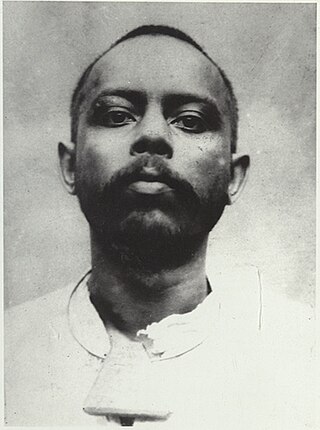
Ullaskar Dutta was an Indian revolutionary associated with Anushilan Samiti and Jugantar of Bengal, and was a close associate of Barindra Ghosh. He was the principal bomb maker of the Jugantar group until Hemchandra Kanungo returned from Paris learning political theory and explosive chemistry.
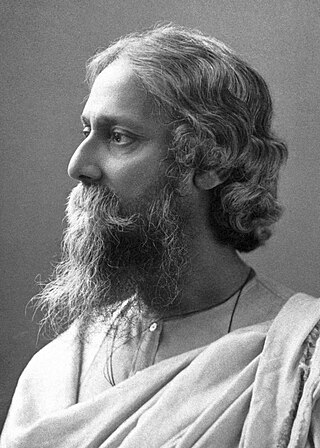
Bengali literature denotes the body of writings in the Bengali language and which covers Old Bengali, Middle- Bengali and Modern Bengali with the changes through the passage of time and dynastic patronization or non-patronization. Bengali has developed over the course of roughly 1,300 years. If the emergence of the Bengali literature supposes to date back to roughly 650 AD, the development of Bengali literature claims to be 1600 years old. The earliest extant work in Bengali literature is the Charyapada, a collection of Buddhist mystic songs in Old Bengali dating back to the 10th and 11th centuries. The timeline of Bengali literature is divided into three periods: ancient (650–1200), medieval (1200–1800) and modern. Medieval Bengali literature consists of various poetic genres, including Hindu religious scriptures, Islamic epics, Vaishnava texts, translations of Arabic, Persian and Sanskrit texts, and secular texts by Muslim poets. Novels were introduced in the mid-19th century. Nobel laureate Rabindranath Tagore is the best known figure of Bengali literature to the world. Kazi Nazrul Islam, notable for his activism and anti-British literature, was described as the Rebel Poet and is now recognised as the National poet of Bangladesh.
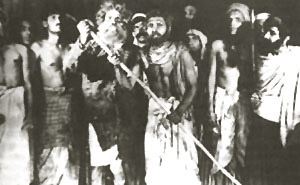
Bengali theatre primarily refers to theatre performed in the Bengali language. Bengali theatre is produced mainly in West Bengal, and in Bangladesh. The term may also refer to some Hindi theatres which are accepted by the Bengali people.

In 1971, the Pakistan Army and their local collaborators, most notably the extreme right wing militia group Al-Badr, engaged in the systematic execution of Bengali intellectuals during the Bangladesh Liberation War of 1971. Bengali intellectuals were abducted, tortured and killed during the entire duration of the war as part of the 1971 Bangladesh genocide. However, the largest number of systematic executions took place on 25 March and 14 December 1971, two dates that bookend the conflict. 14 December is commemorated in Bangladesh as Martyred Intellectuals Day.

Pogose Laboratory School and College, IER, Jagannath University was established in Dhaka on June 12, 1848, as the first private school of the country by Armenian merchant Nicholas Pogose, who was an ex-student of Dhaka Collegiate School. It is located at Chittaranjan Avenue. The school was managed as a proprietary institution and in 1871, about a year after the death of Pogose, it was taken over by Mohini Mohan Das, a banker and zamindar. After the death of Das in 1896 his estate kept the school open.

Shibganj is an upazila of Nawabganj District in the Division of Rajshahi, Bangladesh.
Hindu Mahila Vidyalaya was an all-female boarding school located at 22 Beniapukur Lane, Entally, Kolkata, India. Founded by British translator Annette Akroyd, the school was one of the first in India to provide girl students with a curriculum equivalent to that offered for boys. Sources record different dates for the establishment of the school. While Indian historian Jogesh C. Bagal records the date of establishment as 18 November 1873, American historian David Kopf mentions it as 18 September 1873.
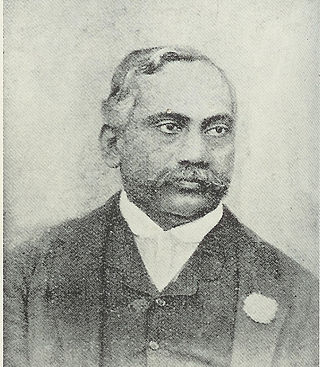
Manmohun Ghose was the first practicing barrister of Indian origin. He is notable for his contributions towards the fields of women's education, for arousing the patriotic feeling of his countrymen and for being one of the earliest persons in the country in organised national politics. At the same time his Anglicised habits often made him a target of ridicule in Calcutta.He was one of the Co-Founders of Indian National Congress.
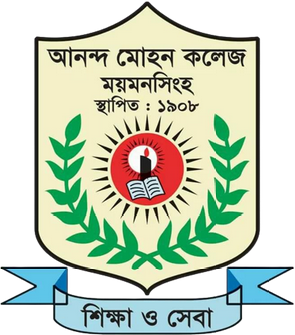
Ananda Mohan College or Government Ananda Mohan College is a fully government-aided public college, affiliated to National University, Bangladesh and Board of Intermediate and Secondary Education, Mymensingh in Mymensingh, Bangladesh. One of the oldest educational premises in South Asia, the institute was established in 1880 by Ananda Mohan Bose as Mymensingh Institution during British Raj.

Pathuriaghata is a neighbourhood of North Kolkata in Kolkata district, in the Indian state of West Bengal. It is one of the oldest residential areas in what was Sutanuti. Once the abode of the Bengali rich, the neighbourhood and its surrounding areas are now dominated by Marwaris. Even in the 21st century the area is replete with colonnaded mansions.
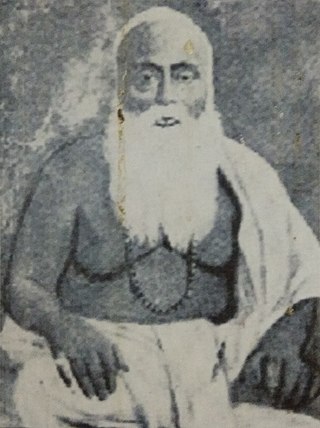
Akshay Chandra Sarkar –was a poet, an editor and a literary critic of Bengali literature.

Prabasi was a monthly Bengali language literary magazine edited by Ramananda Chatterjee.

Jogesh Chandra Ghosh was a scholar, Ayurveda practitioner, entrepreneur and philanthropist. He pioneered the use of Ayurveda in British India and founded the Ayurvedic drugstore Sadhana Aushadhalaya. In the genocide during the Bangladesh Liberation War, he was shot to death by the Pakistan Army.
The Sylheti or 'Sylhetis' are an Indo-Aryan ethnocultural group that are associated with the Sylhet region. There are strong diasporic communities in Barak Valley of Assam, India, North Tripura, as well as in rest of Bangladesh and northeast India. They speak Sylheti, an Eastern Indo-Aryan language that is considered "a distinct language by many and a dialect of Bengali by some others".
Feminism in Bangladesh seeks equal rights of women in Bangladesh through social and political change. Article 28 of Bangladesh constitution states that "Women shall have equal rights with men in all spheres of the State and of public life".
Saralabala Sarkar was an Indian Bengali writer.

John Elliot Drinkwater Bethune (1801–1851) was an English educator, mathematician and polyglot known for promoting women's education in India. He was the founder of Calcutta Female School in Calcutta, which is considered the oldest women's college in Asia. He started his professional life as a lawyer in England and came to India by his appointment as a law member of the Governor General's Council of Ministers. His efforts to further women's education were actively supported by Ishwar Chandra Vidyasagar and other members of the Bengali Renaissance.
















